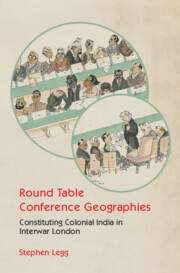Book contents
- Frontmatter
- Contents
- List of Figures and Tables
- Acknowledgements
- Note on Conversions, Spellings and Abbreviations
- 1 Introduction: Squaring Round Tables
- Part I Geographical Imaginations
- Part II Conference Infrastructures
- Part III The Conference City
- Part IV Representations
- Notes
- References
- Index
- Miscellaneous Endmatter
8 - Social London: Residing and Dining
Published online by Cambridge University Press: 15 January 2023
- Frontmatter
- Contents
- List of Figures and Tables
- Acknowledgements
- Note on Conversions, Spellings and Abbreviations
- 1 Introduction: Squaring Round Tables
- Part I Geographical Imaginations
- Part II Conference Infrastructures
- Part III The Conference City
- Part IV Representations
- Notes
- References
- Index
- Miscellaneous Endmatter
Summary
A HOSPITABLE CITY?
Londoners would be the first to agree that theirs is an eminently self-satisfied city. London does not worry greatly about the opinion of the foreigner. All through the centuries she has been wooed, and it has left her blasé. With her jumble of new and old, of majesty and meanness, she has the perpetual air of saying, ‘Take me or leave me! I’m good enough for those who like me and much too good for those who don’t.’
The social city in which the Round Table Conference (RTC) was inaugurated in 1930 represented and reproduced the ambiguities and anxieties wracking the nation and the empire. The ‘roaring’ 1920s had seen the British Empire reach its zenith in terms of extent but had also fostered the anti-colonial sentiment that was calling it into question. As the consequences of the financial crash of 1929 played out across the country, unemployment mounted, finances were in crisis and, a month ahead of the RTC opening, unemployed demonstrators clashed with mounted police at the House of Commons, Hyde Park, High Holborn and Bow (see Figure 4.1). While London was still one of the world’s great social scenes, there were fears that it, too, was past its heyday. During the Naval Conference in the spring of 1930 the journalist and author Valentine Williams imagined how blasé London, as described above, would be viewed by visiting delegates and their staff. How would they square the Rolls Royces and jewels of the West End with beggars on the street and unemployment statistics in the newspapers?
This was part of a broader representational crisis facing 1930s London. Anna Cottrell (2018) suggests that novels and photographs of 1930s London played on the anxiety that its much vaunted cosmopolitanism was derivative, of France and America, and increasingly penetrated by synthetic middle-class spaces of leisure and recreation. Elitist commentators could dismiss as substitutes for real life the new, brightly lit streets of the West End, bounded by Bond Street, Oxford Street, Kingsway and the Strand. Yet in its mass entertainments, affordable eateries and shady spots for night-time escapades others saw nuanced negotiations of modernity in London’s ‘pleasure district’ (McWilliam 2020).
- Type
- Chapter
- Information
- Round Table Conference GeographiesConstituting Colonial India in Interwar London, pp. 221 - 254Publisher: Cambridge University PressPrint publication year: 2023



